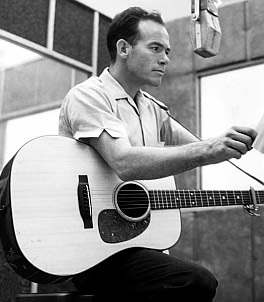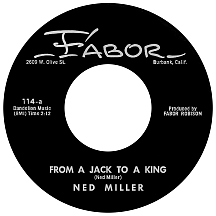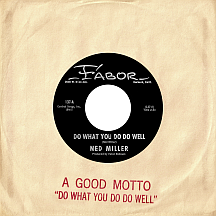NED MILLER
From a Jack to a King
Salt Lake City-born singer Henry Ned Miller had a problem that interfered with his chosen career: as a young boy, he was uncomfortable around large crowds. By the time he reached adultood, it had developed into a nagging, persistent case of stage fright. Serving in the Marine Corps during World War II was less nerve-wracking than getting in front of even a small audience and speaking...or, worse yet, singing. That was just how he was built. So he found a way around the issue by becoming a songwriter, and a very good one at that. But there was a need at some point to perform the songs he'd written, on demonstration discs at the very least, and it turns out he was pretty good at that, too. So what choice was there but to sometimes perform in public? Or quit?
Miller grew up in Rains, a Carbon County coal mining town (that has long since been abandoned) in eastern Utah; his mother bought him an inexpensive guitar when he was nine and taught him how to play it. While attending high school, more than a hundred miles away in the Salt Lake City area, he began singing at parties. Following graduation in 1943 came a tour with the Marines; most of his wartime duty was served in the South Pacific. Afterwards, he married Clara Magers, who went by the unlikely nickname "Sue." Working as a pipe fitter and later as the manager for a cab company in Vernal, Utah, he regularly scratched his musical itch by singing country songs on a local radio station, 1340 KVEL, under the abbreviated name Ned Miller. Upon turning 30, a decision was made to get serious about following his dream; Ned and Sue headed for Los Angeles in 1956 and he began auditioning for various labels, landing a deal with Fabor Robison, who was impressed with his songwriting skills.
Like Miller, Bonnie Guitar was over 30 and had relocated to L.A. from Seattle, Washington. Robison also took her under his wing and in late 1956 she recorded Miller's composition "Dark Moon" for the Fabor label. Attempts at gaining a foothold on country radio came to naught; only after Robison licensed the track to Randy Wood's Dot Records in early 1957 did the record begin to catch on...at pop stations! Then Wood did a rare thing, recording the song with one of his label's biggest stars, Gale Storm, releasing it shortly after the original. In April '57, Bonnie's disc took an early lead on the national pop survey, while Gale's joined it in the upper reaches in May. Miller and Fabor watched in awe as this battle of covers, both on Dot, unfolded. Both versions reached the top ten in early June, TV star Storm ultimately had the better-selling version and Ned Miller reaped double the royalty benefits as composer. In all of recorded music history, you'd be hard-pressed to find another instance of two competing versions of the same song, on the same label, in the top ten simultaneously.
This peculiar-but-successful incident created an opportunity for Ned Miller to record for Dot Records. He could have made records for Robison's Abbott or Fabor labels, but the exposure a major company could offer was too good to pass up. Miller's singer-songwriter career began with "From a Jack to a King" ('...from loneliness to a wedding ring...'), a clever song using card games ('...I played an ace and I won a queen...') to illustrate the gamble ('...with no regret I stacked the cards last night...') of gaining romance ('...and lady luck played her hand just right'). But it appears the hand was lost; the song went nowhere. "Turn Back" proved a disappointing follow-up; he'd begun doing live perfomances to promote the songs and the uneasiness of being on stage may have worked against him. He even asked a friend to sub for him, figuring onlookers wouldn't know the difference. This dude had what seemed to be an irreparable hang-up. He had a better time co-writing "Mister Fire Eyes" with Bonnie Guitar; her infectious recording became a mid-charting hit in late '57.

Then Randy Wood dropped him from Dot. Combining country, pop, rock and folk styles, the singles that followed on Fabor Records couldn't be considered automatic candidates for C&W airplay. There was "Roll O Rollin' Stone" and, in mid-'58, "Gypsy," for another Robison label, Radio. Ned and his wife Sue had been writing together for some time; one song was "Ring the Bell for Johnny," a 1959 duet with Jan Howard on the Jackpot label. But nothing clicked, even when Capitol Records gave him a shot. "Cold Gray Bars," a downer prison song penned by oldtime star Spade Cooley, and Ned's own take on "Dark Moon," placed him squarely in the country groove. Yet nothing resulted.
The answer was to do some recycling. A re-release of "From a Jack to a King" on Fabor broke through every bit as strong as the dual "Dark Moons" had more than five years earlier. In the early months of 1963 the song, despite its dated sound, was all over the radio, peaking in the pop top ten in February and finally placing him on the country charts at number two for four weeks in March and April. Robison produced all of Miller's sessions for his label; "One Among the Many" and "Another Fool Like Me" were top 30 country hits in '63. Meanwhile, songs penned by Ned and Sue were invading the airwaves including "Who's Been Cheating Who" by Johnny and Jonie Mosby and "That's Why I Sing in a Honky Tonk" by former Sun Records rocker Warren Smith.
In 1964, Ned spent several weeks in the country top 20 with one of his and Sue's most heartfelt compositions, "Invisible Tears" ('...incredible pain in my heart...'), covered immediately by The Ray Conniff Singers, who landed it in the "Easy Listening" top ten. Ned was on a roll; his second-biggest hit (top ten country and mid-chart pop) came a few months later: "Do What You You Do Do Well" was inspired by advice his father had given. "A good motto," followed by the title, was rubber-stamped on plain white sleeves sent out with promo and for-sale copies; the term gained wider usage in the spring of '65, popularized further by Ernest Tubb's cover version, a minor hit at the same time.
Seizing an opportunity to return to Capitol, Ned signed a three-year deal but had only a few minor chart efforts (all originals written with and without his wife), including "Whistle Walkin'" in '65, "Summer Roses" and "Teardrop Lane" in '66 and "Hobo" in '67. The upside for Ned and Sue came with some of the songs they'd composed for others, particularly Sonny James' chart-topping country smash "Behind the Tear" in the fall of '65 and other popular songs by Jim Reeves ("Snow Flake" in '66) and Jean Shepard ("Heart, We Did All We Could" in '67). Country A&R director Ken Nelson, who produced all of Miller's Capitol sessions, was less than satisfied by the outcome and, noting that the singer seldom toured, which adversely affected potential sales of the product, canceled his contract in 1968.
One final, minor hit single came in 1970 with "The Lover's Song" on Republic. Shortly thereafter, 45-year-old Ned Miller quit for good. Ridding himself of the pressure to continually confront his stage fright came as a relief. He lived in Prescott, Arizona and Las Vegas, Nevada and occasionally enjoyed writing new songs, but avoided making any personal appearances. He and Clara "Sue" Miller lived happily together for another 45 years. One event in 1989 interrupted their quiet lives: a remake of his famous song, "From a Jack to a King," became a major hit for Ricky Van Shelton. Ned appreciated the song's revival, but resisted any offers to take the stage and sing it again.



